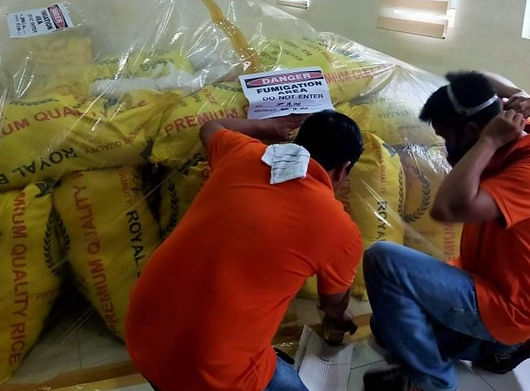Bacolod Fumigation Service
Fumigation Services in Bacolod and Negros Occidental are essential for safeguarding your stored food commodities, such as rice, corn, grains, cereals, flour, and spices, from destructive pests like weevils and beetles. These pests can infest your stored products, leading to cross-contamination and significant loss of quality and value.
At Jansen Pest Control, we specialize in fumigation treatments that protect your warehouse or storage facility from these harmful pests. Our Bacolod fumigation services are designed to efficiently eliminate pests like weevils, beetles, and other stored product pests, preventing damage to your commodities and ensuring your stock remains safe for use.
Why Choose Jansen Pest Control's Fumigation Service:
-
Comprehensive Pest Control: Our fumigation service effectively targets and eliminates a wide range of stored product pests, including weevils, beetles, and larvae, which are commonly found in food commodities like rice, cereals, and flour.
-
Phosphine Fumigation Treatment: We use phosphine fumigation, a proven and effective treatment for controlling pests in stored food products. Phosphine gas penetrates stored goods, eliminating pests without contaminating the product itself.
-
Regular Treatment for Ongoing Protection: Our fumigation service is available on a scheduled basis, ensuring that your food products are consistently protected from pest infestations. Regular treatments reduce the risk of cross-contamination and keep your commodities in optimal condition.
-
Safe and Effective: Our fumigation methods are carried out by trained professionals who follow strict safety guidelines, ensuring both your products and your employees remain protected.
Protect your food products and ensure quality control with Jansen Pest Control's professional fumigation services in Bacolod and Negros Occidental. Contact us today to schedule a fumigation treatment and secure your warehouse or storage facility against pest damage!

Efficacy of Bacolod fumigation treatment
Phosphine Fumigation for Effective Pest Control in Bacolod & Negros Occidental is a highly reliable and globally recognized solution for eliminating pests in stored commodities like rice, grains, flour, cereals, and spices. At Jansen Pest Control, we use phosphine fumigation to eradicate pests without contaminating your products, ensuring the highest standards of pest management for your warehouse or storage facility.
Why Choose Jansen Pest Control's Phosphine Fumigation Service?
-
Proven Global Effectiveness: Phosphine fumigation is widely used and trusted worldwide for controlling stored product pests. It is an efficient method of eliminating harmful insects like weevils, beetles, and larvae that infest stored food commodities.
-
Safe and Non-Contaminating: Unlike other pest control methods, phosphine fumigation does not contaminate the products being treated. The treatment is carefully applied according to the prescribed standards, ensuring your stored goods remain safe for consumption.
-
Customized Fumigation Conditions: The effectiveness of phosphine fumigation depends on several factors, including temperature, humidity, and the gas-tightness of the storage area. At Jansen Pest Control, our experts assess and adjust these conditions to ensure optimal results for your stored products. We ensure longer exposure times when necessary, especially for large or bulk commodity storage areas.
-
Long-Term Pest Control: While phosphine fumigation is highly effective, in some cases, re-infestation may occur in long-term storage. Our team will assess the need for additional treatments to provide long-term protection and prevent future pest problems.
-
Careful Monitoring & Application: Our trained professionals monitor the fumigation process closely, ensuring that phosphine gas is distributed evenly and penetrates the entire commodity mass. For better results, we implement extended exposure times when needed, especially in large or poorly sealed storage containers.
-
Safe for Your Products and Environment: When conducted properly, phosphine fumigation is safe and efficient, providing you with non-infested material for the food industry without introducing harmful residues.
Protect your stored products from pest infestations with Jansen Pest Control's phosphine fumigation services in Bacolod and Negros Occidental. Schedule a consultation today for professional pest control and fumigation treatment designed to preserve the quality of your stored goods and eliminate pest risks effectively!

